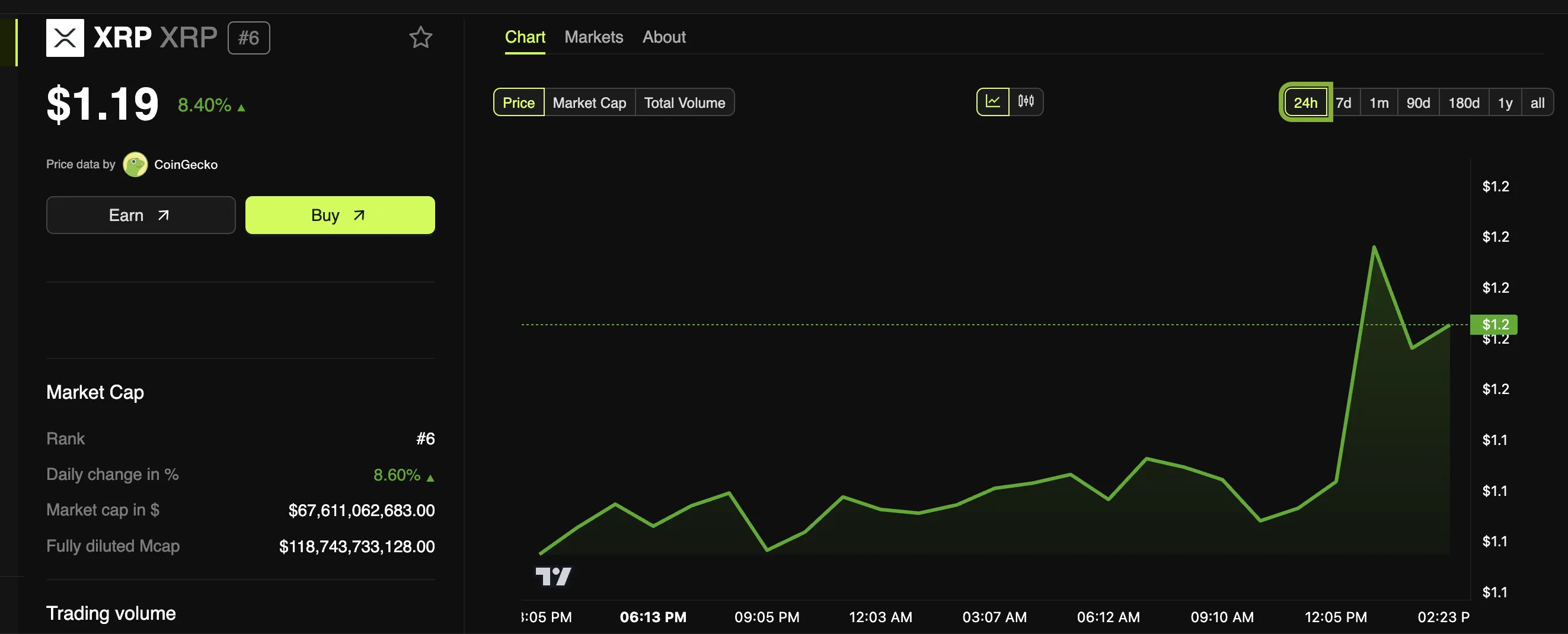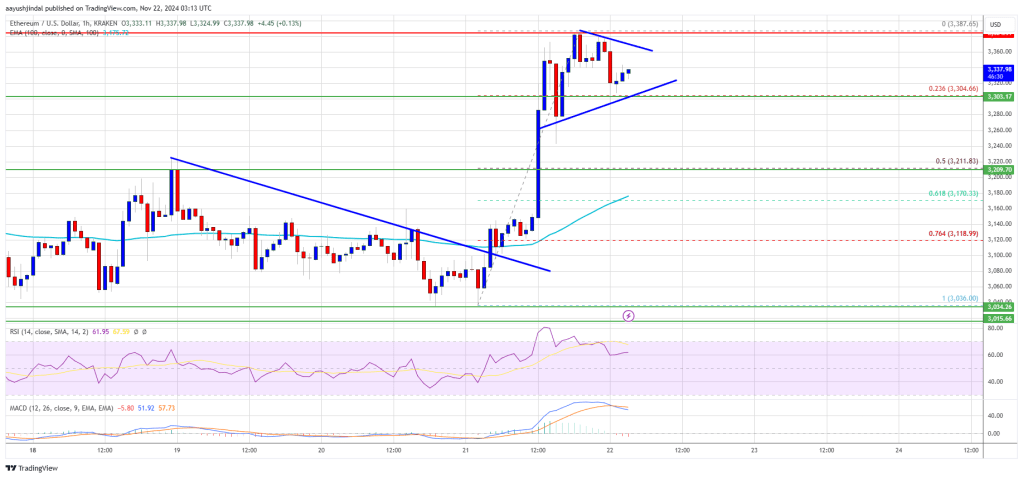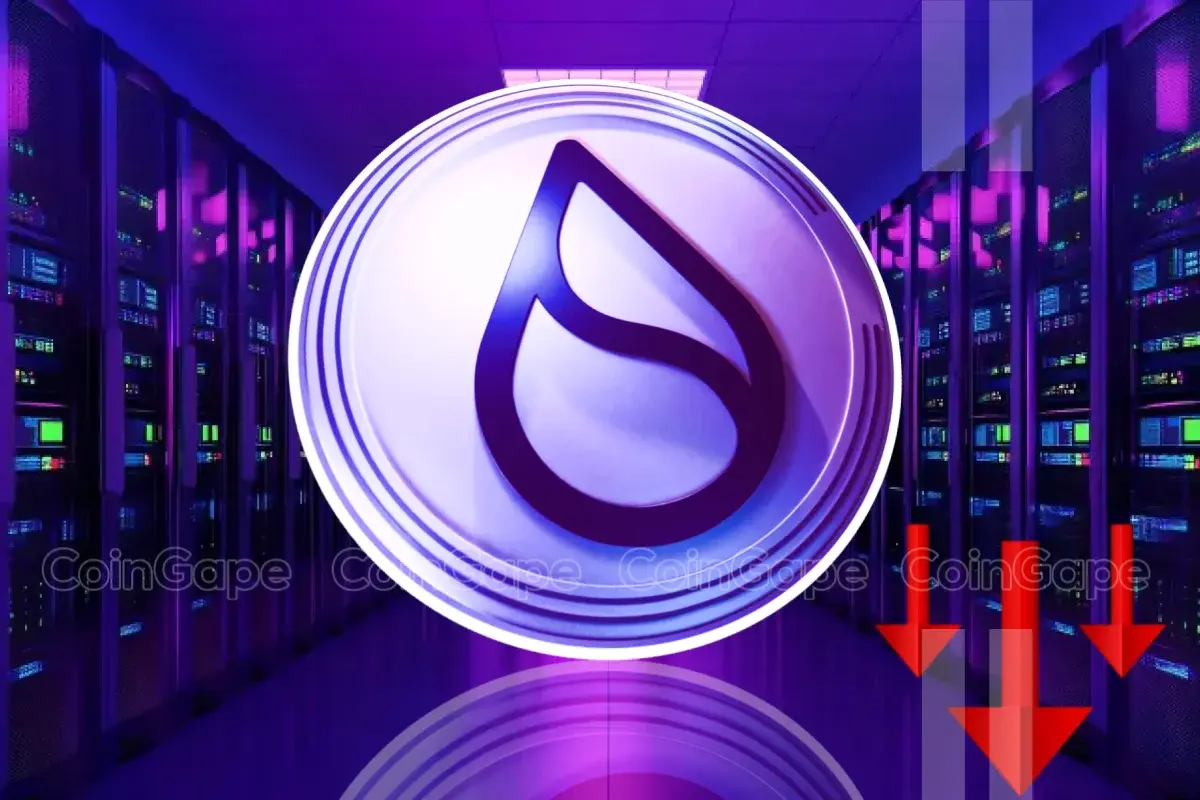Market
Why Ripple-Backed OpenEden Saw a Sharp TVL Drop in 24 Hours

OpenEden, a platform focused on tokenizing real-world assets (RWA), recently experienced a significant drop in its total value locked (TVL) following allegations against its co-founder, Eugene Ng.
As a growing name in tokenization, OpenEden has attracted industry heavyweights like Ripple and Binance. The platform aims to deliver a cost-effective and accessible way for investors to tap into tokenized treasuries, offering blockchain-based access to traditional financial assets.
Why OpenEden’s TVL Declined by Around $30 Million
According to DeFillama data, OpenEden’s TVL dropped sharply from around $153 million to $123 million on November 1. However, the metric has rebounded slightly to $134.5 million at the time of writing.
Total value locked, or TVL, measures the amount of cryptocurrency held in a platform’s smart contracts. When TVL declines, it suggests that users may be withdrawing funds, often due to reduced confidence in the platform or a search for better investment options.
Read more: What is Tokenization on Blockchain?

However, market observers have linked this decline in OpenEden’s TVL to recent allegations against Ng. On October 29, a woman named Hana shared photos and messages on social media platform X, alleging that an executive from DWF Labs had drugged her. Though she did not name the individual, subsequent reports identified Ng, a notable figure in the Asian crypto sector and a former head of business development at Gemini, as the accused.
“I went briefly to the bathroom that night during our meeting and when I came back I took a few sips of the drink before the aggressor stepped outside to make a call. The waitress then rushed over to alert me that my drink has been spiked,” Hana alleged.
In response, both OpenEden and DWF Labs took swift action against the alleged suspect. OpenEden initially suspended Ng and soon after confirmed his termination, emphasizing its commitment to taking the allegations seriously and condemning Ng’s alleged actions.
On November 1, Andrei Grachev, head of crypto market maker DWF Labs, announced that the firm would withdraw its funds from OpenEden and pursue legal action against Ng. Grachev expressed shock at Ng’s alleged actions and called for severe consequences against him.
“I’ve seen the CCTV video, I was shocked at how he could do such shit. It’s the worst that a man could do, and it should entail severe punishment, no mercy. We withdraw our funds and consider further legal actions against Eugene,” Grachev stated.
Read more: What is The Impact of Real World Asset (RWA) Tokenization?
Meanwhile, the incident has sparked wider discussions within the crypto sector around the safety and treatment of women, an issue that remains pertinent in a predominantly male industry. Following these allegations, Ng’s social media profiles on platforms like X and LinkedIn have been deactivated.
Disclaimer
In adherence to the Trust Project guidelines, BeInCrypto is committed to unbiased, transparent reporting. This news article aims to provide accurate, timely information. However, readers are advised to verify facts independently and consult with a professional before making any decisions based on this content. Please note that our Terms and Conditions, Privacy Policy, and Disclaimers have been updated.
Market
WisdomTree Europe Launches XRP ETP

ETF issuer WisdomTree’s European division just announced a new ETP based on XRP. This product is currently available in four EU countries, which has led XRP’s price to jump slightly.
ETPs are a common issuer strategy to earn revenue without ETF approval, but Europe will not necessarily approve one even if the US does so.
WisdomTree’s XRP ETP
WisdomTree, one of the Bitcoin ETF issuers in the US, announced that its European branch is offering an exchange-traded product (ETP) based on XRP. This new product is currently available in Germany, Switzerland, France, and the Netherlands. A growing number of issuers have filed for an XRP ETF, but WisdomTree is taking a slightly different tack.
“The WisdomTree Physical XRP ETP offers a simple, secure, and low-cost way to gain exposure to XRP, one of the largest cryptocurrencies by market capitalization. Backed 100% by XRP, XRPW is the lowest-priced XRP ETP in Europe, providing direct spot price exposure,” the announcement claimed.
The possibility of an official XRP ETF is growing with the current bull market, and Ripple CEO Brad Garlinghouse considers it “inevitable.” Still, it hasn’t happened yet, and ETP offerings allow issuers to somewhat address customers’ requirements. BitWise, which has also filed for an XRP ETF in the US, recently acquired a European ETP issuer to enter the same market.
WisdomTree, however, is no stranger to this market strategy. In May this year, it won approval to offer ETPs based on Bitcoin and Ethereum to British investors.
The UK has not yet approved a full ETF for either of these assets, but WisdomTree still gained market access. Even a fraction of the XRP market could also prove lucrative; the asset’s value spiked today.

WisdomTree Europe’s strategy page does not describe any further actions upon full approval. Even if the US approves an XRP ETF under the SEC’s new leadership, that won’t necessarily benefit WisdomTree’s European branch. For now, these ETPs built on XRP will have to suffice for this market.
Disclaimer
In adherence to the Trust Project guidelines, BeInCrypto is committed to unbiased, transparent reporting. This news article aims to provide accurate, timely information. However, readers are advised to verify facts independently and consult with a professional before making any decisions based on this content. Please note that our Terms and Conditions, Privacy Policy, and Disclaimers have been updated.
Market
Rallies 10% and Targets More Upside

Ethereum price started a fresh increase above the $3,220 zone. ETH is rising and aiming for more gains above the $3,350 resistance.
- Ethereum started a fresh increase above the $3,220 and $3,300 levels.
- The price is trading above $3,250 and the 100-hourly Simple Moving Average.
- There is a short-term contracting triangle forming with resistance at $3,360 on the hourly chart of ETH/USD (data feed via Kraken).
- The pair could gain bullish momentum if it clears the $3,385 resistance zone.
Ethereum Price Regains Traction
Ethereum price remained supported above $3,000 and started a fresh increase like Bitcoin. ETH gained pace for a move above the $3,150 and $3,220 resistance levels.
The bulls pumped the price above the $3,300 level. It gained over 10% and traded as high as $3,387. It is now consolidating gains above the 23.6% Fib retracement level of the recent move from the $3,036 swing low to the $3,387 high.
Ethereum price is now trading above $3,220 and the 100-hourly Simple Moving Average. On the upside, the price seems to be facing hurdles near the $3,350 level. There is also a short-term contracting triangle forming with resistance at $3,360 on the hourly chart of ETH/USD.

The first major resistance is near the $3,385 level. The main resistance is now forming near $3,420. A clear move above the $3,420 resistance might send the price toward the $3,550 resistance. An upside break above the $3,550 resistance might call for more gains in the coming sessions. In the stated case, Ether could rise toward the $3,650 resistance zone or even $3,880.
Another Decline In ETH?
If Ethereum fails to clear the $3,350 resistance, it could start another decline. Initial support on the downside is near the $3,300 level. The first major support sits near the $3,250 zone.
A clear move below the $3,250 support might push the price toward $3,220 or the 50% Fib retracement level of the recent move from the $3,036 swing low to the $3,387 high. Any more losses might send the price toward the $3,150 support level in the near term. The next key support sits at $3,050.
Technical Indicators
Hourly MACD – The MACD for ETH/USD is gaining momentum in the bullish zone.
Hourly RSI – The RSI for ETH/USD is now above the 50 zone.
Major Support Level – $3,250
Major Resistance Level – $3,385
Market
Rallies 10% and Targets More Upside

Ethereum price started a fresh increase above the $3,220 zone. ETH is rising and aiming for more gains above the $3,350 resistance.
- Ethereum started a fresh increase above the $3,220 and $3,300 levels.
- The price is trading above $3,250 and the 100-hourly Simple Moving Average.
- There is a short-term contracting triangle forming with resistance at $3,360 on the hourly chart of ETH/USD (data feed via Kraken).
- The pair could gain bullish momentum if it clears the $3,385 resistance zone.
Ethereum Price Regains Traction
Ethereum price remained supported above $3,000 and started a fresh increase like Bitcoin. ETH gained pace for a move above the $3,150 and $3,220 resistance levels.
The bulls pumped the price above the $3,300 level. It gained over 10% and traded as high as $3,387. It is now consolidating gains above the 23.6% Fib retracement level of the recent move from the $3,036 swing low to the $3,387 high.
Ethereum price is now trading above $3,220 and the 100-hourly Simple Moving Average. On the upside, the price seems to be facing hurdles near the $3,350 level. There is also a short-term contracting triangle forming with resistance at $3,360 on the hourly chart of ETH/USD.

The first major resistance is near the $3,385 level. The main resistance is now forming near $3,420. A clear move above the $3,420 resistance might send the price toward the $3,550 resistance. An upside break above the $3,550 resistance might call for more gains in the coming sessions. In the stated case, Ether could rise toward the $3,650 resistance zone or even $3,880.
Another Decline In ETH?
If Ethereum fails to clear the $3,350 resistance, it could start another decline. Initial support on the downside is near the $3,300 level. The first major support sits near the $3,250 zone.
A clear move below the $3,250 support might push the price toward $3,220 or the 50% Fib retracement level of the recent move from the $3,036 swing low to the $3,387 high. Any more losses might send the price toward the $3,150 support level in the near term. The next key support sits at $3,050.
Technical Indicators
Hourly MACD – The MACD for ETH/USD is gaining momentum in the bullish zone.
Hourly RSI – The RSI for ETH/USD is now above the 50 zone.
Major Support Level – $3,250
Major Resistance Level – $3,385
-

 Ethereum22 hours ago
Ethereum22 hours agoFundraising platform JustGiving accepts over 60 cryptocurrencies including Bitcoin, Ethereum
-

 Market19 hours ago
Market19 hours agoSouth Korea Unveils North Korea’s Role in Upbit Hack
-

 Market23 hours ago
Market23 hours agoCardano’s Hoskinson Wants Brian Armstrong for US Crypto-Czar
-

 Bitcoin14 hours ago
Bitcoin14 hours agoMarathon Digital Raises $1B to Expand Bitcoin Holdings
-

 Market14 hours ago
Market14 hours agoETH/BTC Ratio Plummets to 42-Month Low Amid Bitcoin Surge
-

 Altcoin24 hours ago
Altcoin24 hours agoSHIB Burn Rate Surges 2200%, Shiba Inu Eyes Parabolic Rally Ahead?
-

 Altcoin17 hours ago
Altcoin17 hours agoSui Network Back Online After 2-Hour Outage, Price Slips
-

 Market22 hours ago
Market22 hours agoLitecoin (LTC) at a Crossroads: Can It Rebound and Rally?






















